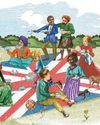
In late April 1945, a squad of German troops encircled a farm on the Dutch island of Texel, briefly stopped to catch their breath, and then set about their gruesome work. First they set fire to the farmhouse, and then they waited for their quarry to emerge. They shot those who made the break for safety, and when others took refuge in a nearby pig shed, they set that ablaze too.
However, two men did manage to elude the Germans, taking temporary shelter in the farm’s cellar, and later slipping away under cover of darkness. Exhausted, they hid in a nearby ditch. The following morning, a farmer found them asleep and alerted the marauding troops. They quickly arrived on the scene and put the fugitives to death. It was a grisly scene. And it was made all the more darkly bizarre by the fact that both the victims and those doing the shooting, were wearing German uniforms.
So why would Wehrmacht troops inflict such brutalities on so-called ‘comrades’? And why were they doing so during the death throes of the Third Reich – at a time when, across Europe, thousands of their compatriots were laying down their arms and surrendering?
The answer lies in the identity of the men they hunted down and killed. These victims may have worn German uniforms but they had no loyalty to the Wehrmacht. They were, in fact, former prisoners of war – Red Army men from Soviet Georgia who had switched sides. And the rebellion they had launched against German forces on Texel would trigger the final battle of Europe’s Second World War.
A stark dilemma
This story is from the June 2020 edition of BBC History Magazine.
Start your 7-day Magzter GOLD free trial to access thousands of curated premium stories, and 9,000+ magazines and newspapers.
Already a subscriber ? Sign In
This story is from the June 2020 edition of BBC History Magazine.
Start your 7-day Magzter GOLD free trial to access thousands of curated premium stories, and 9,000+ magazines and newspapers.
Already a subscriber? Sign In

"People have achieved all kinds of crazy things at the age of 18″
ALICE LOXTON talks to Danny Bird about her book on 18 individuals who left an indelible mark on British history before they were out of their teens

Parthian chicken
ELEANOR BARNETT recreates an ancient Roman dish that borrowed flavours from a rival neighbouring empire in the Middle East

"We need a meaningful story for the new generation - our composite union"
WHAT A SUMMER IT’S BEEN SO FAR, WITH AN astonishing election result.

A Pole apart
ROGER MOORHOUSE is absorbed by a little-known but politically significant Polish princess whose life encompassed the major events of the later 18th and 19th centuries

Medieval England's p olitical miracle
From Magna Carta to parliament, taxation to the law courts, the 13th and 14th centuries laid the foundations for the modern British state

EASTERN PROMISES
Lured by rich trading prospects, from the 17th to the 19th centuries Britain attempted to cultivate relations with China sometimes successfully, but often disastrously. Kerry Brown explores the troubled but ultimately vital links between two ambitious realms

THE GENIUS IN THE SHADOWS
Æthelstan is one of the greatest of all Anglo-Saxon monarchs. So why, asks Michael Wood, does the first king of the English remain so fiendishly elusive?

The king they couldn't kill
Want to know why Henry VII is remembered as an intensely suspicious king, wracked by paranoia? The answer, writes Nathen Amin, lies in his death-defying rise to power

THE SPY WHO HOODWINKED HITLER
Dummy tanks at El Alamein. Bogus generals in Algiers. Sham armies on D-Day. All were ruses masterminded by Dudley Clarke. Robert Hutton tells the story of the British soldier who made an art form of duping the Nazis

The long road back The election was tough for the Conservatives - but the past holds clues on how parties can return from the brink
It’s election night 1997, and Jeremy Paxman is grilling Tory grandee Cecil Parkinson.